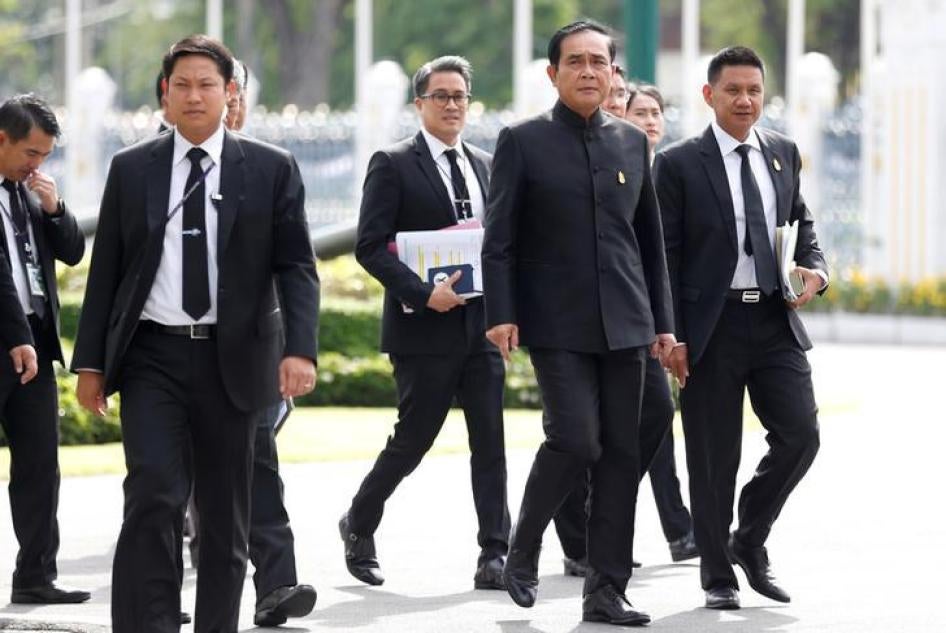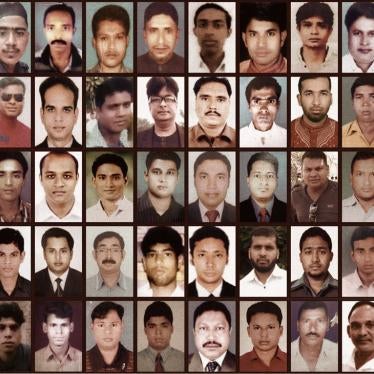(New York) – The Thai government should promptly act to fulfill past pledges to make torture a criminal offense, Human Rights Watch said today. On June 26, 2017, on the United Nations International Day in Support of Victims of Torture, the government created a committee to receive complaints and investigate allegations of torture and enforced disappearance. But without a law recognizing these crimes, the new body can do little beyond providing compensation for victims and their families.
Since taking power in a military coup in May 2014, the government of Prime Minister Prayut Chan-ocha has repeatedly pledged to criminalize torture under Thai law and to meet Thailand’s obligations under the Convention against Torture and Other Cruel, Inhuman or Degrading Treatment or Punishment, which Thailand ratified in 2007. However, on February 28, the junta-appointed National Legislative Assembly decided to indefinitely suspend its consideration of the Prevention and Suppression of Torture and Enforced Disappearance Bill, and the government has not clarified whether the bill will be reintroduced.
“Thailand needs to stop pretending it is in compliance with the Convention against Torture and recognize that the absence of a law prohibiting torture only encourages mistreatment of people in custody,” said Brad Adams, Asia director at Human Rights Watch. “Without any real prospect of punishment, the Thai military and police will keep torturing suspects.”
The draft law would criminalize torture and enforced disappearance with no exemptions for political or security reasons. Government officials who commit torture would face up to 20 years in prison, or 30 years if the torture results in serious injury, and life imprisonment if it causes death. Commanders or supervisors of officials who commit torture would face 50 percent of the punishment ordered by the court if they intentionally ignore information or deny knowledge of instances of torture or enforced disappearance committed by their subordinates. Similar penalties would apply to officials responsible for enforced disappearance.
Torture has long been a problem in Thailand, Human Rights Watch said. Human Rights Watch has documented numerous cases in the southern border provinces, in which police and military personnel allegedly tortured ethnic Malay Muslims in custody. The most common forms of torture have been ear slapping, punching, kicking, beating, using electric shocks, and near strangulation or suffocation with plastic bags. There are also credible reports of torture being used as a form of punishment of military conscripts, which have resulted in some deaths. Since the May 2014 military coup, many individuals taken into incommunicado military custody have alleged being tortured or otherwise ill-treated while being detained and interrogated by soldiers.
Successive Thai governments have failed to conduct serious and credible inquiries into torture allegations. In many cases, Thai authorities retaliated against those alleging torture and other serious abuses by filing defamation lawsuits under the Penal Code or the Computer Crimes Act for intending to damage the reputation of their agencies or individual officials.
The Convention against Torture specifically places an obligation on governments to investigate and prosecute those responsible for torture and other ill-treatment. Article 4 of the convention states that a government should “ensure that all acts of torture are offences under its criminal law. The same shall apply to an attempt to commit torture and to an act by any person which constitutes complicity or participation in torture.” The government should also “make these offences punishable by appropriate penalties, which take into account their grave nature.”
On March 10, the National Legislative Assembly approved ratification of the International Convention for the Protection of All Persons from Enforced Disappearance, which Thailand signed in 2012. However, the government has not yet set a clear time frame for depositing the treaty with the United Nations secretary-general as required. Enforced disappearance is defined under international law as the arrest or detention of a person by state officials or their agents followed by a refusal to acknowledge the deprivation of liberty, or to reveal the person’s fate or whereabouts.
“Prime Minister Prayut’s pledges on the international stage to end torture just can’t be taken seriously,” Adams said. “Governments concerned about Thailand’s deteriorating human rights situation should speak out and encourage passage of the proposed anti-torture law.”








